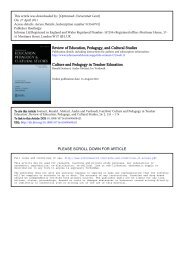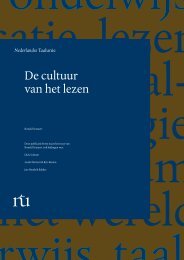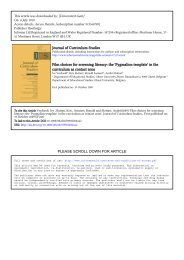a view informed by the problems of traditional literacy in a digital age
a view informed by the problems of traditional literacy in a digital age
a view informed by the problems of traditional literacy in a digital age
Create successful ePaper yourself
Turn your PDF publications into a flip-book with our unique Google optimized e-Paper software.
Downloaded <strong>by</strong> [University <strong>of</strong> Gent] at 06:46 09 December 2011<br />
Ronald Soetaert & Bart Bonamie<br />
developments. Very <strong>of</strong>ten, anxiety <strong>in</strong> a culture is caused <strong>by</strong> a fundamental<br />
technological change.<br />
In education, too, we are confronted with some major changes:<br />
democracy has changed education, even classrooms have become more<br />
democratic ow<strong>in</strong>g to a learner-centred perspective. Efforts to create national<br />
and <strong>in</strong>ternational standards have proved to be very complex and probably<br />
<strong>in</strong>effective.<br />
But why are langu<strong>age</strong> and literature <strong>in</strong> particular under such heavy<br />
pressure? Because <strong>the</strong> core <strong>of</strong> <strong>the</strong> discipl<strong>in</strong>e – books, literature, <strong>the</strong> literary<br />
canon, <strong>traditional</strong> writ<strong>in</strong>g and read<strong>in</strong>g – is under heavy attack: ‘Perhaps <strong>the</strong><br />
real question for literary study now is not whe<strong>the</strong>r our students will be<br />
read<strong>in</strong>g Great Traditional Books or Relevant Modern ones <strong>in</strong> <strong>the</strong> future, but<br />
whe<strong>the</strong>r <strong>the</strong>y will be read<strong>in</strong>g books at all’ (Lanham, 1993, p. 3). Indeed, it is<br />
not surpris<strong>in</strong>g that ‘we should demonstrate more than <strong>the</strong> usual anxiety at<br />
<strong>the</strong> advent <strong>of</strong> emerg<strong>in</strong>g technologies. In our weakened state, what will <strong>the</strong>se<br />
technologies do <strong>in</strong> English? To text? To books? To research? To teach<strong>in</strong>g?’<br />
(Moran, 1998, p. 203).<br />
Pil<strong>in</strong>g up <strong>in</strong>formation is not <strong>the</strong> ideal easy solution for <strong>the</strong> complex<br />
<strong>problems</strong> <strong>in</strong> cultural <strong>literacy</strong>, ra<strong>the</strong>r it is part <strong>of</strong> <strong>the</strong> problem. Hirsch’s list<br />
consists <strong>of</strong> <strong>the</strong> core knowledge possessed <strong>by</strong> <strong>the</strong> common reader. We would<br />
like to add that Hirsch assumes <strong>the</strong> select ‘common reader’ <strong>of</strong> elitist<br />
knowledge. But how will we decide what exactly will be <strong>in</strong>cluded and<br />
excluded from <strong>the</strong> list? Whose list are we defend<strong>in</strong>g? What exactly do we<br />
mean <strong>by</strong> <strong>the</strong> common reader? What exactly do we mean when we say<br />
‘cultural <strong>literacy</strong>’? Is <strong>the</strong>re a list that is not cultural at all?<br />
Hirsch’s list is a myth from <strong>the</strong> past (<strong>in</strong> which <strong>the</strong> ‘list’ and <strong>the</strong><br />
‘common reader’ are presented as natural phenomena, not as cultural<br />
constructions). Learn<strong>in</strong>g <strong>the</strong> appropriate cultural <strong>literacy</strong> was an opportunity<br />
for people belong<strong>in</strong>g to a certa<strong>in</strong> class, or people want<strong>in</strong>g to become a<br />
member <strong>of</strong> that particular class. A past <strong>in</strong> which <strong>the</strong> literary canon was <strong>the</strong><br />
k<strong>in</strong>g’s road to all teach<strong>in</strong>g – langu<strong>age</strong> teach<strong>in</strong>g <strong>in</strong> particular.<br />
In back-to-basics <strong>the</strong>re is a deep nostalgia for <strong>the</strong> return <strong>of</strong> ‘<strong>the</strong><br />
Arbiter’: ‘he who knows what’s good and why, and can place every form <strong>of</strong><br />
cultural expression <strong>in</strong> its natural order’ (Bérubé, 1998, p. 93 cit<strong>in</strong>g Bloom,<br />
1994). Elitist discourse may reduce all popular or alternative culture<br />
because <strong>the</strong> arbiters <strong>of</strong> this elitist discourse do not participate <strong>in</strong> <strong>the</strong><br />
discourse <strong>of</strong> those communities. But <strong>the</strong> new networks and communities<br />
also create a productive discourse: a space for creat<strong>in</strong>g a new culture and a<br />
new elite or probably new elites.<br />
Problematis<strong>in</strong>g Art/Technology<br />
The critical reception <strong>of</strong> art very <strong>of</strong>ten creates a dualistic art/artefact<br />
dist<strong>in</strong>ction between high and low. When we focus on ‘taste’, we realise that<br />
130





